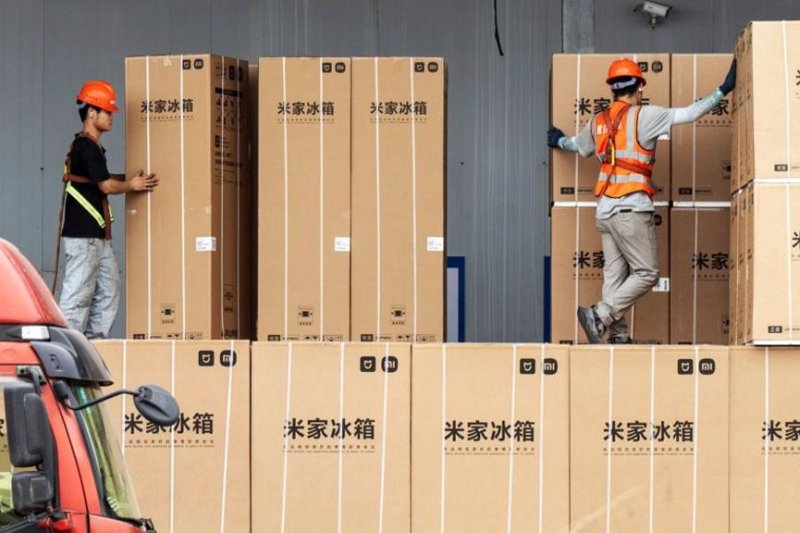China Retaliates against Trump with 84% Levy on US Goods, as EU Confirms New US Tariffs
China on Wednesday announced an additional 50% retaliatory tariff on all U.S. imports, bringing the total tariff level to 84%.
The measures are a response to President Trump's latest round of tariffs, which went into effect overnight, and include a 104% levy on Chinese goods.
The Chinese finance ministry says the new charges will take effect at midnight in China, or Wednesday noon Eastern time.
"The US's practice of escalating tariffs on China is a mistake on top of a mistake," the ministry said in a statement announcing the fresh round of levies.
China calls on the U.S. to cancel its tariffs against Chinese goods, "and properly resolve differences with China through equal dialogue on the basis of mutual respect," the ministry added.
Hopes had risen among some investors that the U.S. would strike trade deals to lower the tariffs over time, leaving the punitive measures as a temporary negotiating tactic. Trump has signaled he is willing to talk, posting Tuesday on Truth Social that China "wants to make a deal, badly."
But Trump's statement was undermined by the new measures, which sent Dow futures down more than 700 points. S&P futures are also down 1.8% and Nasdaq futures tumbled more than 1.4%.
Global stock market slump continues
Stock markets in Europe opened Wednesday with sharp downturns. In London, Frankfurt and Paris, share prices fell once more in early trading Wednesday after recovering some of their value earlier this week. The French and German markets remained almost 12% lower than they were a week ago, when the new tariffs were first announced.
Cherry blossoms bloom across the street from the Tokyo Stock Exchange building in Tokyo on Wednesday.
Earlier, many markets across Asia had also slumped, with Japan's Nikkei closing down nearly 4%. South Korea's KOSPI fell 1.74% and Taiwan's composite index shed 5.79%. Hong Kong's benchmark Hang Seng Index opened down more than 3% before recovering to close up about 1%.
In mainland China, key indexes closed up more than 1%, despite Chinese goods being the hardest hit. The steep new levy was a response to Beijing issuing reciprocal tariffs of 34% on American goods last week.
Other countries try negotiations
Japan is the country with the largest foreign direct investment in the United States and Japanese negotiators are scheduled to hold talks in Washington that could include discussions of foreign currency exchange rates as Trump has accused Tokyo of devaluing the yen to support Japanese exports — something Japan has repeatedly denied.
Trade negotiators from South Korea, another close American trading partner, will also begin talks with the U.S. soon as the government in Seoul announces a series of emergency actions, including subsidies and tax breaks, to support the country's export sectors, including auto manufacturers.
Meanwhile, the deputy prime minister of Vietnam, which has in recent decades become a global center for low-cost manufacturing, will meet with Treasury Secretary Scott Bessent on Wednesday to discuss the 46% tariffs placed on its exports to the U.S.
The stock market in Vietnam fell almost 10% on Wednesday, the sharpest in Asia, and during the past week it has fallen almost 20%.
India also said the country is engaging with the United States. India's external affairs minister said on Wednesday that the two countries are hammering out a bilateral trade agreement, which could conclude by the fall of this year.
Recession fears raised further at home
Fears of a U.S. and indeed a wider global recession have been further heightened by the continued plunge of America's largest stock market, the S&P 500. Its descent this past week has been steeper than at any moment in the past seven decades.
Alongside that destruction of trillions in corporate value over recent days, government bonds — traditionally considered safer than equities — have also plummeted, while President Trump has confused investors by describing the tariffs as "permanent," while also boasting that global leaders have requested trade negotiations that might include offers to end their own preexisting tariffs or non-trade barriers on U.S. goods.
The U.S.-based investment bank JP Morgan has said its economists estimate there is now a 60% chance that the world could enter a recession by the end of 2025.













